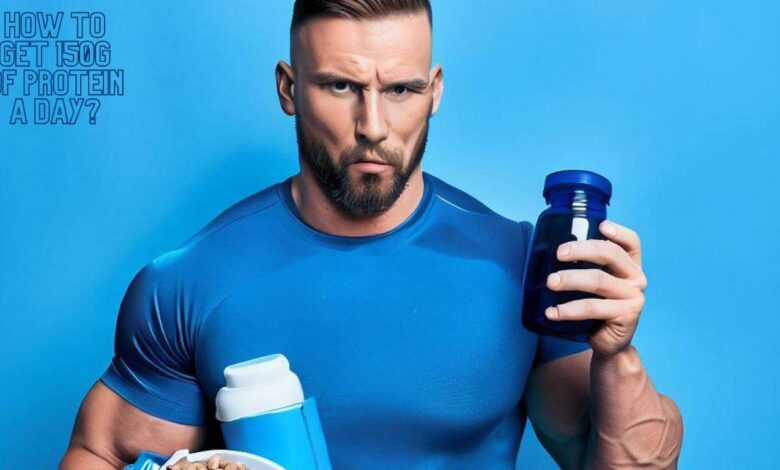How to Get 150g of Protein a Day?

Protein is important for your body and helps with many functions. If you want to gain muscle, perform well in fitness, or just stay healthy, it’s crucial to have enough protein. This article will explain protein and its sources. It will also give practical tips to help you reach the goal of consuming 150g of protein daily.
Protein is essential for life. It helps with muscle repair, enzyme production, hormone regulation, and immune function. It helps with tissues, muscles, weight, and feeling full. Consuming enough protein is key to optimizing your overall health and well-being.
Recommended Daily Protein Intake
To figure out how much protein you need each day, think about your age, gender, activity level, and goals. Most adults need around 0.8 grams of protein for every kilogram they weigh. If you want to build muscle, do intense physical activity, or have certain health conditions, it might help to increase how much protein you eat. Aim for 1.2-2.2 grams of protein per kilogram of body weight.
Understanding Different Sources of Protein
Protein comes from both animals and plants. Animal proteins have all the amino acids you need. Plant proteins might need some mixing with other foods to give you all the amino acids. Let’s look at some common choices in each group.
Proteins from Animals
Animal proteins are in things like lean meats, chicken, fish, eggs, and dairy. They have lots of good protein and important stuff like iron, vitamin B12, and omega-3 fats. To get enough protein, try different animal-based foods.
Proteins from Plants
Plant proteins are in things like beans, whole grains, nuts, seeds, and some veggies. Plant proteins might not have all the amino acids you need, but you can make complete proteins by mixing different plant foods. Plus, plant proteins have fiber, antioxidants, and other good things for your health.
Protein-Packed Breakfast Ideas
Start your day with a high-protein breakfast. It boosts your metabolism and keeps you energized. Try Greek yogurt with berries and nuts, avocado toast with scrambled eggs, or a protein smoothie with spinach and almond butter. It’s a tasty and healthy way to begin your day!
High-Protein Lunch Ideas
If you’re looking for a tasty and healthy lunch, here are some ideas packed with protein:
- Grilled chicken or tofu salad.
- Quinoa with roasted veggies and chickpeas.
- A turkey wrap with avocado and hummus.
High-Protein Dinner Ideas
For a well-rounded and protein-filled dinner, consider these options:
- Grilled salmon with quinoa and steamed broccoli.
- Lean beef stir-fry with mixed vegetables.
- Roasted chicken breast with sweet potato and asparagus.
High-Protein Snack Ideas
To keep your energy levels up throughout the day, enjoy these protein-rich snacks:
- Greek yogurt with honey and almonds.
- Hard-boiled eggs.
- Protein bars.
- A handful of mixed nuts.
These delicious options will help you meet your protein needs and satisfy your taste buds!
Protein Shakes and Supplements
Sometimes it can be challenging to get enough protein from regular meals. That’s when protein shakes and supplements can come in handy. Choose protein powders or shakes that match your preferences and goals.
How to Incorporate Protein into Your Diet
Incorporating protein into your daily meals doesn’t have to be complicated. Make a meal plan, eat foods with lots of protein, and try out new recipes. Be mindful of portion sizes and consult a registered dietitian for personalized guidance.
Meal Planning for 150g of Protein a Day
Meal planning can help you achieve your protein goals efficiently. Create a weekly meal plan. Cook a lot of protein-rich meals in one go. Divide them into portions for easy access. Make sure to include a variety of protein sources to enhance nutrient intake.
Also Read: How Much Protein Do I Need a Day if I Weigh 100 Pounds?
Common Challenges and Solutions
Getting 150g of protein each day can be tricky. You might face challenges like special diets, not enough time, or not liking certain foods. To make it simpler, consider using various protein sources, cooking meals in advance, and experimenting with new flavors and cooking methods.
Benefits of Consuming Sufficient Protein
Having enough protein is good for you. It does more than just help your muscles; it can also help you manage your weight by keeping you full, controlling your blood sugar, making your bones strong, and helping your body heal when you’re sick or hurt. So, make sure to get enough protein for better health.
Conclusion:
Getting 150g of protein per day may seem hard, but if you plan well and know about protein-packed foods, you can do it. Make sure to include different sources of animal and plant protein in your meals. Plan your meals by prepping them ahead of time. If necessary, think about using protein shakes or supplements. To improve your overall health and well-being, prioritize protein in your diet. It offers numerous benefits that are worth unlocking.
FAQs:
1. How can I calculate my daily protein needs?
To figure out how much protein you need each day, multiply your weight by the recommended protein range for your activity level and goals. If you weigh 70 kilograms and do intense physical activity, multiply by 1.8. This will give you a daily protein goal of 126 grams.
2. Can I consume too much protein?
Eating enough protein is important for good health. However, if you have existing kidney or liver issues, consuming too much protein can be harmful. It’s important to consult a healthcare professional or registered dietitian for personalized guidance on protein intake.
3. Are vegetarian protein sources sufficient for meeting protein needs?
Vegetarian protein sources can give you all the amino acids you need for protein. If you mix beans and rice or lentils and quinoa, you get all the amino acids your body needs.
4. Can protein help with weight loss?
Eating foods high in protein can help you lose weight. These foods make you feel full, boost your metabolism, and preserve your muscles. Adding protein to your meals and snacks can keep you feeling full longer. This makes it easier to stick to a diet with controlled calories and avoid eating too much.
5. Can I get enough protein on a vegan diet?
Yes, it is possible to meet your protein needs on a vegan diet. Plant-based protein sources like legumes, tofu, tempeh, seitan, and quinoa are excellent options. To ensure a complete set of amino acids, you can mix various proteins from plants throughout the day.
6. Are there any risks associated with protein supplements?
Protein supplements are generally safe for healthy individuals when consumed as directed. But make sure to pick well-known brands and talk to a doctor before using any accessories in your routine.



